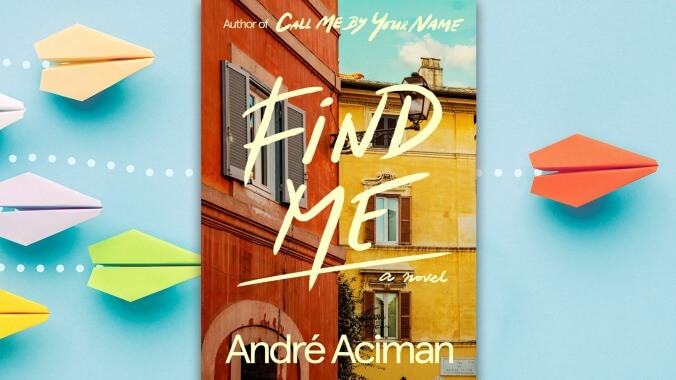Find Me is more fan fiction than a true sequel to Call Me By Your Name

When André Aciman announced he was penning a sequel to his 2007 novel, Call Me By Your Name, which was the basis for an Academy Award-winning film, fans were understandably excited to read the continuation of the sultry romance between Elio and Oliver. But their relationship is relegated to a footnote in Find Me, which instead is primarily a self-insertion fantasy where the 68-year-old author has written two stories about men around his age having lots of sex with much younger people.
Almost half of the book is devoted to Elio’s father, Samuel, who in Call Me By Your Name confessed that he never had the sort of rare love his son found when he struck up a relationship with an academic staying at the family’s summer home in Italy. The now-divorced Samuel gets his chance in Find Me with Miranda, a beautiful woman half his age who he meets on a train to Rome.
“Why so glum?” are the first three words of the book, spoken by Samuel to Miranda. Rather than reacting negatively to this version of “You should smile more,” Miranda starts up a conversation with Samuel about their respective bad luck in love and the works of Dostoevsky.
Call Me By Your Name is filled with similar philosophical and academic monologues, which were mostly excised in the film adaptation or abbreviated into a few character-building scenes. The written ones worked much better in Call Me By Your Name, where the characters were all academics, artists, or precocious teenagers. Here it’s meant to represent a sort of fated, fairy tale meeting of the minds.
It just so happens that Miranda’s father is also a Jewish professor, like Samuel’s. And as they talk, Samuel realizes she’s even hotter than he first thought. When Miranda invites the stranger she’s made a newfound connection with to her dying father’s birthday celebration, Samuel spends the whole affair fantasizing about her in florid prose: “She was beautiful and unreachable, and once again I held myself back from putting my arm around her and letting my lips touch her cheek, her neck, the back of her ear. Could she tell that wanting to hold her both stirred and dismayed me, because I knew there was no room for me in her world.”
But it turns out, there is. Miranda is a classic Manic Pixie Dream Girl, a photographer who takes Samuel around Rome and snaps pictures of him as he regales her with tales of how happy he was when he worked in the city and slept with his students. After less than 24 hours together, they’re having sex, declaring their eternal love, and considering getting tattoos of pictoral representations of each others’ genitals (a lighthouse for his penis, a fig for her vagina). Samuel tells Miranda she’s given him the courage to do things he’s always wanted to do like shave his head, buy a leather jacket, and get his ear pierced. The whole thing would seem like parody if Aciman showed even a bit of self-awareness. As a kicker, Miranda’s whole purpose seems to be to produce a baby for Elio and Oliver to decide is theirs even though she’s still alive.
Elio quickly accepts his father’s new relationship, and winds up in a May-December romance of his own with Michel, a wealthy lawyer he also meets through kismet. Their relationship is an interlude in both the book and Elio’s life, meant to put him on somewhat equal footing with Oliver’s own romantic experience when the two finally reconcile. But the author has no idea what to do with the characters. There are some sex scenes and the sort of elaborate meals that made Call Me By Your Name a sensual pleasure on both the page and screen, but Aciman also has Michel and Elio trying to unravel a historical mystery that doesn’t really go anywhere.
Oliver gets his own brief narrating section, meant to fill in the gaps between the meetings with Elio found at the end of the novel Call Me By Your Name, which continues after the movie’s credits roll. His revelation that he’s never been happier than he was with Elio comes after an attempt to set up a threesome at a party doesn’t work out. The result is that his reconciliation with Elio feels less like the result of 20 years of soul searching and more like receiving a Facebook message from a high school fling who recently set his relationship status to “single.”
What’s infuriating is that when Elio and Oliver finally do come together, Find Me manages to recapture the magic of Call Me By Your Name. There’s a beautiful fragility to the pair’s rekindled romance as they navigate the challenges of wanting to relive their past while building a future. Their emotional and sexual anxieties feel honest and relatable in a way that nothing else in the novel does.
In Call Me By Your Name, Elio laments that he wasted so much time with Oliver because he didn’t realize that his feelings were reciprocated. In Find Me, it’s Aciman who wastes his readers’ time by delivering a lengthy preamble that has nothing to do with what made his original novel great. The film adaptation of Call Me By Your Name is a landmark queer coming-of-age romance, but an adaption of Find Me would just feel like a late-career Woody Allen flick. Maybe someone can stretch the novel’s final chapter into a properly satisfying follow-up, but until then Find Me is a terrible disappointment.